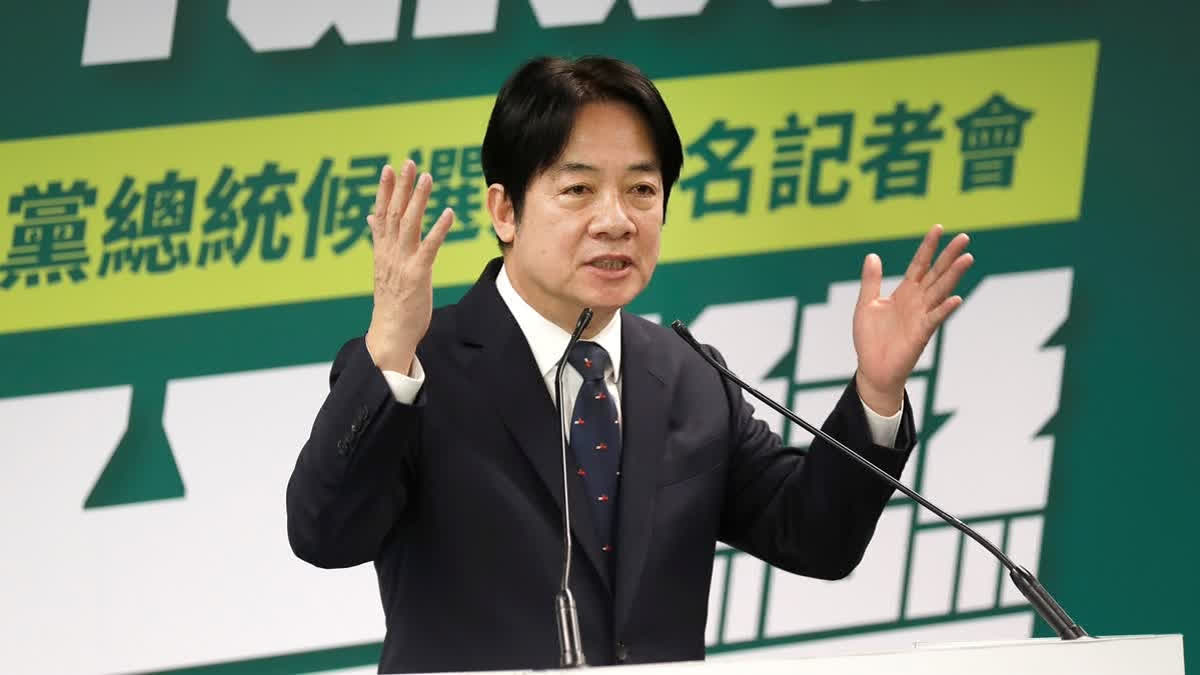Taipei(Taiwan): The result in Taiwan's presidential and parliamentary election will chart the trajectory of relations with China over the next four years. At stake is the peace and stability of the 110-mile-wide strip of water between the Chinese mainland and the self-governed island, which is claimed by China as its own. Apart from tensions with China, the election largely hinged on domestic issues, such as a slowed economy, housing affordability, a yawning gap between rich and poor, and unemployment. With half of votes counted, the candidate from Taiwan's ruling Democratic Progressive Party Lai Ching-te is leading in the race for the presidency according to local media reports. Polls closed Saturday in Taiwan's presidential and parliamentary election that will chart the trajectory of the self-ruled democracy's relations with China over the next four years.
At stake is the peace and stability of the island, 160 kilometers (100 miles) off the coast of China, that Beijing claims as its own and to be retaken by force if necessary. Domestic issues such as the sluggish economy and expensive housing also featured prominently in the campaign.
China has called the poll a choice between war and peace. Beijing strongly opposes the front-runner in the presidential race, current Vice President Lai Ching-te, of the governing Democratic Progressive Party, or DPP.
Lai and incumbent President Tsai Ing-wen reject China's sovereignty claims over Taiwan, a former Japanese colony that split from the mainland amid civil war in 1949. They have, however, offered to speak with Beijing, which has repeatedly refused to hold talks and called them separatists.
Beijing is believed to favor the candidate from the more China-friendly Nationalist party, also known as Kuomintang, or KMT. Its candidate, Hou Yu-ih, has also promised to restart talks with China while bolstering national defense. He promised not to move toward unifying the two sides of the Taiwan Strait if elected.
A third candidate in the race, Ko Wen-je of the smaller Taiwan People's Party, or TPP, has drawn the support particularly of young people wanting an alternative to the KMT and DPP, Taiwan's traditional opposing parties, which have largely taken turns governing since the 1990s. Ko has also stated he wants to speak with Beijing, and that his bottom line would be that Taiwan needs to remain democratic and free.
The United States, which is bound by its laws to provide Taiwan with the weapons needed to defend itself, has pledged support for whichever government emerges, reinforced by the Biden administration's plans to send an unofficial delegation made up of former senior officials to the island shortly after the election.
Beside the China tensions, domestic issues such as the dearth of affordable housing and stagnating wages have dominated the campaign.
For Tony Chen, a 74-year-old retiree who voted in Taipei in the hour before the polls closed, the election boiled down to a choice between communism and democracy.
"I hope democracy wins," he said. He added that more Taiwanese were open to China's model of governance decades ago, when the Chinese economy was growing by double digits annually, but are repulsed by the crackdown on civil liberties that has occurred under current Chinese President Xi Jinping.
Stacy Chen, 43, said she has always voted for DPP because "Taiwan is an independent country." She said she wanted her son to grow up in a country that is separate from China.
For Ben Wang, 44, the vote was more about altering the dynamic between Taiwan's main opposing parties, the DPP and the KMT. A potential attack by China could not be pre-empted by anything Taiwan would do, he said.
Candidates' teams and supporters were gathering at the three parties' headquarters, in Taipei and its suburb, New Taipei. The colorful watch parties featured flags, loud music and large stages.
Lai cast his vote earlier Saturday in his hometown of Tainan. He remarked on the sunny weather, suggesting it was a good day for Taiwanese people to go out and vote. "I encourage everyone around the country to vote with enthusiasm and show the vitality of Taiwan's democracy," he said.
Hou cast his ballot in New Taipei City, a municipality bordering Taipei where he serves as mayor, a position from which he took leave to run for president.
"What we need during the election campaign process is chaos," Hou told reporters. "But after the vote, we must be united and face the future of Taiwan together." Meanwhile, Ko, in his well-known dry manner, said he aimed to try his best every day "and plan for the next stage when we get there."
Taiwan's election is seen as having "real and lasting influence on the geopolitical landscape," said Gabrielle Reid, associate director with the global intelligence consultancy S-RM. "The outcome of the vote will ultimately determine the nature of ties with China relative to the West and will have strong bearing on the state of play in the South China Sea," she said.
Beside the China tensions, domestic issues dominated the campaign, particularly an economy that was estimated to have grown just 1.4% last year. That partly reflects inevitable cycles in demand for computer chips and other exports from the high-tech, heavily trade-dependent manufacturing base, and a slowing of the Chinese economy.
But longer-term challenges such as unaffordable housing and wage stagnation topped voters' concerns. The candidate with the most votes wins, with no runoff. The legislative races are for both districts and at-large seats.
Read More



